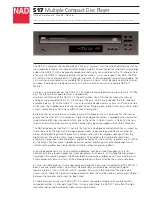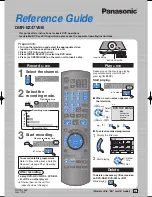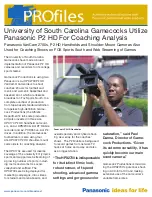
39
English
(3) Permission for use of this software is granted only if the user
accepts full responsibility for any undesirable consequences;
the authors accept NO LIABILITY for damages of any kind.
These conditions apply to any software derived from or based
on the IJG code, not just to the unmodified library. If you use
our work, you ought to acknowledge us.
Permission is NOT granted for the use of any IJG author's name
or company name in advertising or publicity relating to this
software or products derived from it. This software may be
referred to only as "the Independent JPEG Group's software".
We specifically permit and encourage the use of this software
as the basis of commercial products, provided that all warranty
or liability claims are assumed by the product vendor.
ansi2knr.c is included in this distribution by permission of L.
Peter Deutsch, sole proprietor of its copyright holder, Aladdin
Enterprises of Menlo Park, CA. ansi2knr.c is NOT covered
by the above copyright and conditions, but instead by the
usual distribution terms of the Free Software Foundation;
principally,that you must include source code if you redistribute
it. (See the file ansi2knr.c for full details.) However, since
ansi2knr.c is not needed as part of any program generated from
the IJG code, this does not limit you more than the foregoing
paragraphs do.
The Unix configuration script "configure" was produced with
GNU Autoconf. It is copyright by the Free Software Foundation
but is freely distributable. The same holds for its supporting
scripts (config.guess, config.sub,ltconfig, ltmain.sh). Another
support script, install-sh, is copyright by X Consortium. but is
also freely distributable.
The IJG distribution formerly included code to read and write
GIF files. To avoid entanglement with the Unisys LZW patent,
GIF reading support has been removed altogether, and the GIF
writer has been simplified to produce uncompressed GIFs. This
technique does not use the LZW algorithm; the resulting GIF
files are larger than usual, but are readable by all standard
GIF decoders.
We are required to state that "The Graphics
Interchange Format(c) is the Copyright property
of CompuServe Incorporated. GIF(sm) is a Service
Mark property of CompuServe Incorporated."
c-ares
Copyright 1998 by the Massachusetts Institute of Technology.
Permission to use, copy, modify, and distribute this software
and its documentation for any purpose and without fee is
hereby granted, provided that the above copyright notice
appear in all copies and that both that copyright notice and this
permission notice appear in supporting documentation, and
that the name of M.I.T. not be used in advertising or publicity
pertaining to distribution of the software without specific,
written prior permission. M.I.T. makes no representations
about the suitability of this software for any purpose. It is
provided "as is" without express or implied warranty.
GPLv3
GNU GENERAL PUBLIC LICENSE
Version 3, 29 June 2007
Copyright (C) 2007 Free Software Foundation, Inc. <http://
fsf.org/>
Everyone is permitted to copy and distribute verbatim copies
of this license document, but changing it is not allowed.
Preamble
The GNU General Public License is a free, copyleft license for
software and other kinds of works.
The licenses for most software and other practical works are
designed to take away your freedom to share and change the
works. By contrast, the GNU General Public License is intended
to guarantee your freedom to share and change all versions
of a program--to make sure it remains free software for all its
users. We, the Free Software Foundation, use the GNU General
Public License for most of our software; it applies also to any
other work released this way by its authors. You can apply it
to your programs, too.
When we speak of free software, we are referring to freedom,
not price. Our General Public Licenses are designed to make
sure that you have the freedom to distribute copies of free
software (and charge for them if you wish), that you receive
source code or can get it if you want it, that you can change
the software or use pieces of it in new free programs, and that
you know you can do these things.
To protect your rights, we need to prevent others from
denying you these rights or asking you to surrender the rights.
Therefore, you have certain responsibilities if you distribute
copies of the software, or if you modify it: responsibilities to
respect the freedom of others.
For example, if you distribute copies of such a program,
whether gratis or for a fee, you must pass on to the recipients
the same freedoms that you received. You must make sure
that they, too, receive or can get the source code. And you
must show them these terms so they know their rights.
Developers that use the GNU GPL protect your rights with
two steps: (1) assert copyright on the software, and (2) offer
you this License giving you legal permission to copy, distribute
and/or modify it.
For the developers' and authors' protection, the GPL clearly
explains that there is no warranty for this free software. For
both users' and authors' sake, the GPL requires that modified
versions be marked as changed, so that their problems will not
be attributed erroneously to authors of previous versions.
Some devices are designed to deny users access to install or
run modified versions of the software inside them, although the
manufacturer can do so. This is fundamentally incompatible with
the aim of protecting users' freedom to change the software.
The systematic pattern of such abuse occurs in the area of
products for individuals to use, which is precisely where it is
most unacceptable. Therefore, we have designed this version
of the GPL to prohibit the practice for those products. If such
problems arise substantially in other domains, we stand ready
to extend this provision to those domains in future versions of
the GPL, as needed to protect the freedom of users.
Finally, every program is threatened constantly by software
patents. States should not allow patents to restrict development
and use of software on general-purpose computers, but in
those that do, we wish to avoid the special danger that patents
applied to a free program could make it effectively proprietary.
To prevent this, the GPL assures that patents cannot be used
to render the program non-free.
The precise terms and conditions for copying, distribution and
modification follow.
TERMS AND CONDITIONS
0. Definitions.
"This License" refers to version 3 of the GNU General Public
License.
"Copyright" also means copyright-like laws that apply to other
kinds of works, such as semiconductor masks.
"The Program" refers to any copyrightable work licensed under








































